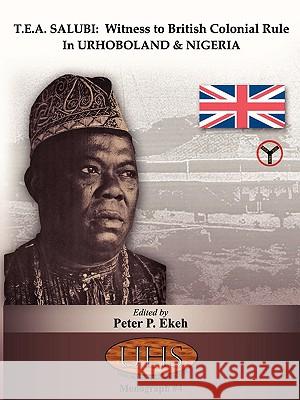T.E.A. Salubi: Witness to British Colonial Rule in Urhoboland and Nigeria » książka
T.E.A. Salubi: Witness to British Colonial Rule in Urhoboland and Nigeria
ISBN-13: 9789780874988 / Angielski / Miękka / 2008 / 604 str.
T. E. A. Salubi: Witness to British Colonial Rule in Urhoboland & Nigeria is a remarkably lucid autobiographical account of the rich experiences of a man whose eventful life spanned the extent of British colonialism in the Western Niger Delta and Nigeria. Adogbeji Salubi was born at the beginning of British colonial rule in Urhoboland, in the hinterland of Western Niger Delta. He attended one of the earliest colonial schools in Urhoboland, before embarking on a two-week canoe voyage through rivers and creeks to distant Lagos, capital of colonial Nigeria, where he completed his elementary school education in 1926. Thereafter, he worked in the Colonial Civil Service, beginning in February 1927. In 1943, Salubi was awarded a scholarship that enabled him to pursue social studies, with emphasis on colonial affairs, at Cambridge University, in partnership with the London School of Economics and Political Science, in war-time England. On retirement from the Civil Service in 1962, Salubi became the chief leader of his people, the Urhobo. He headed Urhobo Progress Union, an organization that was formed by the Urhobo in the 1930s in order to cope with the difficulties that British colonial policies had created for them. When Salubi was thirty-two years old, he took an uncommon decision to narrate his life history for the information of his descendants and posterity. From 1938 onwards, he not only chronicled his recollections of his childhood and the events of his adolescence and youth; he became a serial and disciplined diarist of his adult life. At the time of his death in 1982, Salubi left behind extraordinarily cogent records of his life experiences that reveal a great deal about the nature of British colonial rule in Nigeria. Some of these accounts are now published in this volume along with an illuminating introduction by Peter Ekeh. T. E. A. Salubi: Witness to British Colonial Rule in Urhoboland & Nigeria is enmeshed in Urhobo history and culture. Salubi s early childhood, his growing up in Urhoboland and Lagos, and his adult life shed light on the interface between Urhobo culture and fragments of Western culture that were filtered through British imperialism in Nigeria. Salubi was therefore an effective witness both to colonialism and to his native culture in a unique and compelling manner. Because he chronicled these experiences as they occurred, at a time when his contemporaries offered only verbal narration and distant memories of colonialism, this book stands out in studies of European imperialism in Africa.











